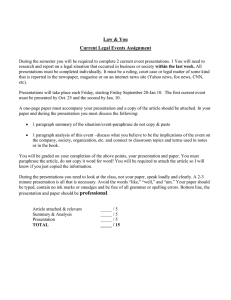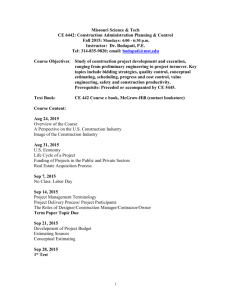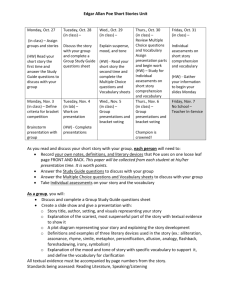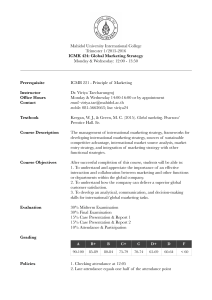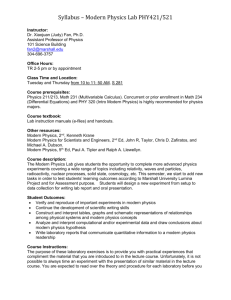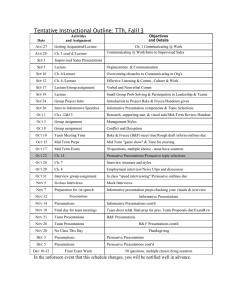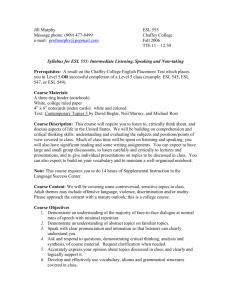578-syllabus - University of Michigan
advertisement
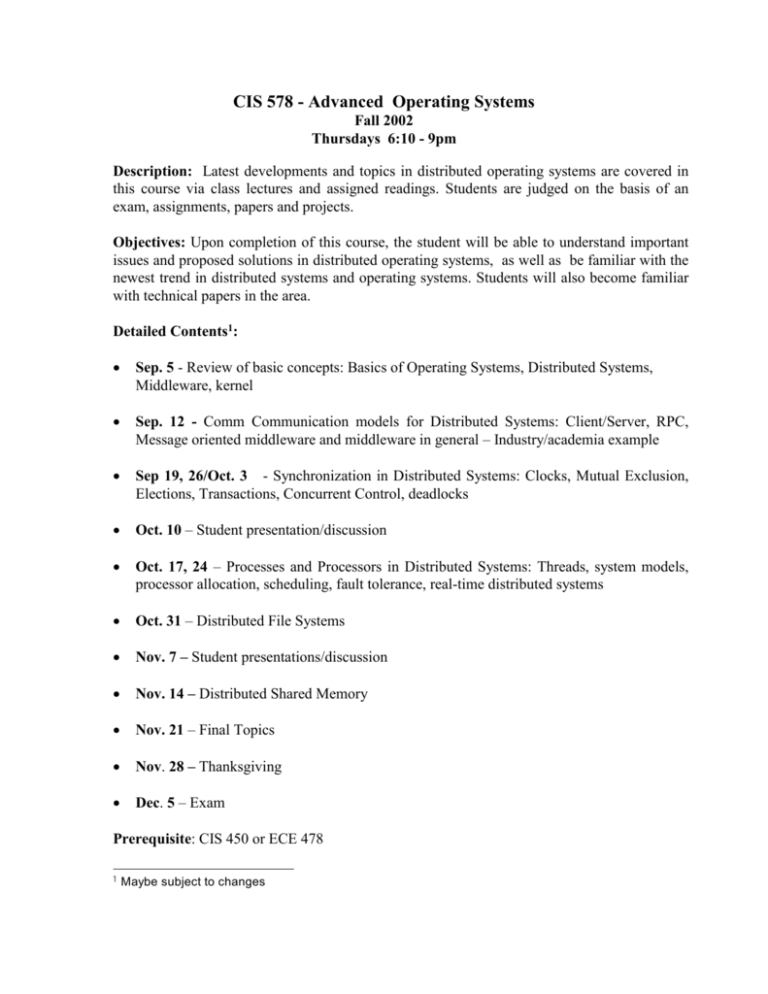
CIS 578 - Advanced Operating Systems Fall 2002 Thursdays 6:10 - 9pm Description: Latest developments and topics in distributed operating systems are covered in this course via class lectures and assigned readings. Students are judged on the basis of an exam, assignments, papers and projects. Objectives: Upon completion of this course, the student will be able to understand important issues and proposed solutions in distributed operating systems, as well as be familiar with the newest trend in distributed systems and operating systems. Students will also become familiar with technical papers in the area. Detailed Contents1: Sep. 5 - Review of basic concepts: Basics of Operating Systems, Distributed Systems, Middleware, kernel Sep. 12 - Comm Communication models for Distributed Systems: Client/Server, RPC, Message oriented middleware and middleware in general – Industry/academia example Sep 19, 26/Oct. 3 - Synchronization in Distributed Systems: Clocks, Mutual Exclusion, Elections, Transactions, Concurrent Control, deadlocks Oct. 10 – Student presentation/discussion Oct. 17, 24 – Processes and Processors in Distributed Systems: Threads, system models, processor allocation, scheduling, fault tolerance, real-time distributed systems Oct. 31 – Distributed File Systems Nov. 7 – Student presentations/discussion Nov. 14 – Distributed Shared Memory Nov. 21 – Final Topics Nov. 28 – Thanksgiving Dec. 5 – Exam Prerequisite: CIS 450 or ECE 478 Maybe subject to changes Text: There is no required text for this course. Various references are recommended: Tanenbaum, “Disributed Operating Systems”, Prentice Hall Coulouris, Dollimore, Kindberg, “Distributed Systems – Concepts and Design”, Addison Wesley Stallings, “Operating Systems”, Prentice Hall Tanenbaum, “Modern Operating Systems”, Prentice Hall Projects/Homework Programming projects as well as question/answer format homework will be handed at the end of each major topic covered. Expected number of assignment/homework: 3 to 4 Homework is to be done individually. Points will be deducted if identical work is submitted. Programming assignments may be done in groups of no more than 3, depending on the level of difficulty. Late homework/project will be deducted 10 points every week. Student presentations Students will be required to read and comprehend technical papers covering the topics addressed in class and/or research topics related to existing operating systems. This may include searching for background information required for understanding the paper/topic in question. All research/presentations should be done in groups of no more than 3. All group members will receive the same grade, unless under abnormal conditions. One or all the group members can do the oral presentation. A short report summarizing the “lessons learned” should be handed in the day of the presentation. Exam The quiz will consist of short question/answers following the homework format. It will cover the topics given during class and the major topics of technical papers and discussions in class. Grading The final grade for this course will be computed as follows: projects: 40%, Student presentations/paper/homework: 40%, Exam: 20% Virtual Learning Tool (VLT) All course information, including this syllabus, as well as class lectures, project information and grades can be obtained from http://vlt.engin.umd.umich.edu/dashboard/ To have access to the course material, all students must register at the vlt site. Registration key for this site is: cis578-2 Students with disabilities The University will make reasonable accommodations for persons with documented disabilities. Students need to register in the Disability Resource Services (DRS) every semester they are taking classes. DRS is located in Counseling and Support Services, 1060 UM. To be assured of having services when they are needed, students should register by September 18. Academic Integrity The University of Michigan-Dearborn values academic honesty and integrity. Each student has a responsibility to understand, accept, and comply with the university's standards of academic conduct as set forth by the Code of Academic Conduct, as well as policies established by the schools and colleges. Cheating, collusion, misconduct, fabrication, and plagiarism are considered serious offenses. Violations will not be tolerated and may result in penalties up to and including expulsion from the University. Policy for Course Refund The grades for this course will be solely based on the student's achievements and participation. The need for company refund will not be considered when grading, i.e., do not assume that your grade will be a 'B' or higher grade just because you need a refund. Policy for an "Incomplete" Grade An "Incomplete" will only be given under limited circumstances: - if not able (due to urgent/unforeseen circumstances) to write the exam (and if all other homework/projects were submitted) - if a maximum of 2 homework/project need to be completed Instructor Information Dr. Hasina Abdu Office: Rm 122A ELB Office Hours: TBA E-mail: hasiabdu@engin.umd.umich.edu
